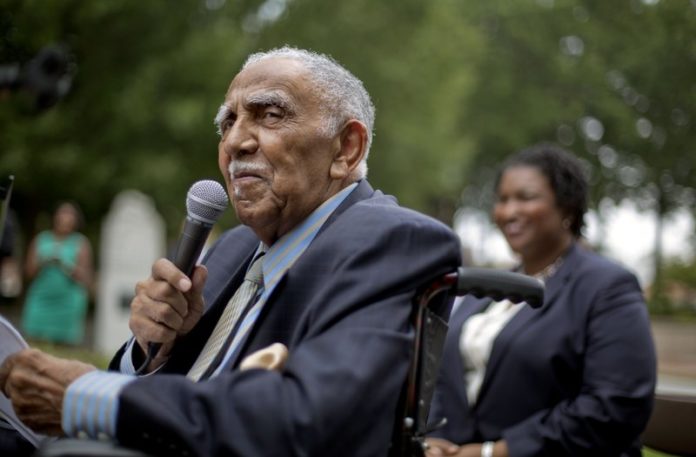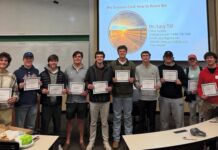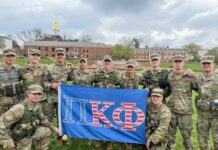ATLANTA (AP) — The Rev. Joseph E. Lowery fought to end segregation, lived to see the election of the country’s first black president and echoed the call for “justice to roll down like waters and righteousness like a mighty stream” in America.
For more than four decades after the death of his friend and Alpha Phi Alpha Fraternity brother, the Rev. Martin Luther King Jr., the fiery Alabama preacher was on the front line of the battle for equality, with an unforgettable delivery that rivaled King’s — and was often more unpredictable. Lowery had a knack for cutting to the core of the country’s conscience with commentary steeped in scripture, refusing to back down whether the audience was a Jim Crow racist or a U.S. president.
Lowery, 98, died Friday at home in Atlanta, surrounded by family members, they said in a statement.
He died from natural causes unrelated to the coronavirus outbreak, the statement said.
“Tonight, the great Reverend Joseph E. Lowery transitioned from earth to eternity,” The King Center in Atlanta remembered Lowery in a Friday night tweet. “He was a champion for civil rights, a challenger of injustice, a dear friend to the King family.”
Lowery led the Southern Christian Leadership Conference for two decades — restoring the organization’s financial stability and pressuring businesses not to trade with South Africa’s apartheid-era regime — before retiring in 1997.
Considered the dean of civil rights veterans, he lived to celebrate a November 2008 milestone that few of his movement colleagues thought they would ever witness — the election of an African-American president.
An early and enthusiastic supporter of Obama over then-Democratic opponent Hillary Clinton, Lowery also gave the benediction at Obama’s inauguration.
Lowery was pastor of the Warren Street Methodist Church in Mobile, Alabama, in the 1950s when he met King, who then lived in Montgomery, Alabama. Lowery’s meetings with King, the Rev. Ralph David Abernathy and other civil rights activists led to the SCLC’s formation in 1957. The group became a leading force in the civil rights struggle of the 1960s.
Lowery became SCLC president in 1977 following the resignation of Abernathy, who had taken the job after King was assassinated in 1968. He took over an SCLC that was deeply in debt and losing members rapidly. Lowery helped the organization survive and guided it on a new course that embraced more mainstream social and economic policies.
Like King, Lowery juggled his civil rights work with ministry. He pastored United Methodist churches in Atlanta for decades and continued preaching long after retiring.
Born in Huntsville, Alabama, in 1921, Joseph Echols Lowery grew up in a Methodist church where his great-grandfather, the Rev. Howard Echols, was the first black pastor. Lowery’s father, a grocery store owner, often protested racism in the community.
After college, Lowery edited a newspaper and taught school in Birmingham, but the idea of becoming a minister “just kept gnawing and gnawing at me,” he said. After marrying Evelyn Gibson, a Methodist preacher’s daughter, he began his first pastorate in Birmingham in 1948.
In a 1998 interview, Lowery said he was optimistic that true racial equality would one day be achieved.
“I believe in the final triumph of righteousness,” he said. “The Bible says weeping may endure for a night, but joy cometh in the morning.”
A member of Alpha Phi Alpha fraternity, Lowery is survived by his three daughters, Yvonne Kennedy, Karen Lowery and Cheryl Lowery.























